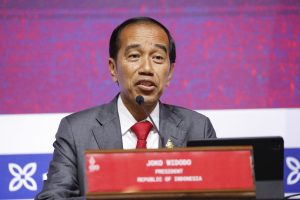A resources giant, the vast archipelago of Indonesia produces mineral resources such as copper, nickel, aluminum and zinc. In January 2020, the Indonesian government banned the export of non-smelted nickel ore. Then, on December 21, 2022, President Joko “Jokowi” Widodo also issued a statement that, starting in June 2023, the country “will impose a ban of bauxite ore exports and encourage the domestic bauxite processing and refining industry.”
In Indonesia, there have long been voices of discontent among members of the both House of Representatives and the public, saying that the nation is being stripped of its vast mineral resources by foreign companies without any kind of refining and the profits were not being returned to the people.
The EU initiated a challenge to Indonesia’s restrictions on the export of non-smelted ores at the WTO in November 2019 and, on November 30, 2020, the subcommittee (dispute-settlement panel) ruled that the restrictions were a violation of the WTO agreement. However, Indonesia has no intention of reversing its policies, and Jokowi has made clear his determination to ban the exports of bauxite as well, saying, “We will steadily implement the export ban on non-smelted ores. We do not mind if there is an appeal to the WTO.”
Following the panel ruling, Indonesia immediately appealed to the WTO Appellate Body. If the Appellate Body concludes that the restrictions are a violation of the WTO Agreement, Indonesia will be required to take corrective action. If Indonesia fails to take corrective action, retaliatory measures as agreed by the WTO will be implemented.
Underlying Jokowi’s bullish tone is the dysfunction of the WTO Dispute Settlement Body (DSB), which is supposed to play an important role in the matter.
The dysfunction of the DSB has been evident since December 2019, with the U.S. blocking the appointment of new members of the WTO’s Appellate Body and preventing the WTO from securing the three Appellate Body members required for each appeal. When a panel decision is appealed, the findings of the panel are not ratified until the Appellate Body’s review is complete. Well aware of this, Indonesia made its appeal into the void, effectively kicking the can down the road.
However, the Multi-Party Interim Appeal Arbitration Arrangement (MPIA) has been provisionally established as an alternative to the Appellate Body, with 52 countries and regions out of the 164 member countries and territories participating in the arrangement. The EU passed an amendment to its regulations in February 2021 to ensure that retaliatory measures are still adopted even if non-participants in the MPIA lodge an appeal, although these amended regulations have yet to be applied.
The successive export bans introduced by Indonesia are the antithesis of the WTO framework. In 1994, the Uruguay Round of Multilateral Trade Negotiations culminated in an agreement establishing the WTO, which was launched the following year. In exchange for WTO membership, developing counties are required to assume a number of obligations. Yet they do not actually enjoy the benefits that ought to accrue from reduced market tariffs in developed countries’ markets, and thus harbor considerable dissatisfaction and distrust towards developed countries.
Joining the WTO has forced many Southeast Asian countries to abandon their previous economic development models. Prior to WTO membership, these countries would attract export-oriented foreign investment in a way that would not affect their domestic industry, by imposing local content requirements on companies so as to attract upstream component companies, and by imposing export requirements, without affecting their domestic industries. This export-oriented foreign investment would then be used as an engine of industrialization. However, since 2000, five years after the establishment of the WTO, performance requirements – special measures which countries apply to companies entering their markets – were banned. This stripped developing nations of tools that were effective for attracting investment and developing domestic industry.
In banning the export of non-smelted ores, Jokowi insisted that downstreaming would be hugely beneficial for the country in terms of personal and corporate taxation and the creation of local employment. In fact, he has succeeded in attracting smelters and battery factories for electric vehicles in the non-smelted ores sector. Between 2014 and 2020, the number of nickel smelters increased from two to 16. LG Group and Hyundai Motor Group from Korea, as well as China’s Contemporary Amperex Technology have all agreed to build EV battery plants.
The WTO freed companies from their obligations, including local sourcing and export requirements, allowing them to optimize their production and sourcing locations. For developing countries, however, that meant new and very real challenges in developing domestic industry. This is one of the factors behind Indonesia’s decision to ban exports of non-smelted ores. As things stand, the gap between resource-rich and resource-poor countries, and even the gaps among emerging countries, may grow even wider.
WTO reforms, including its system for resolving disputes, are currently underway. What is really needed, though, is a review of the systems from a more inclusive perspective, giving greater consideration to the industrial development of developing countries. Indonesia’s ban on ore exports may be the shakeup WTO reforms need.
































